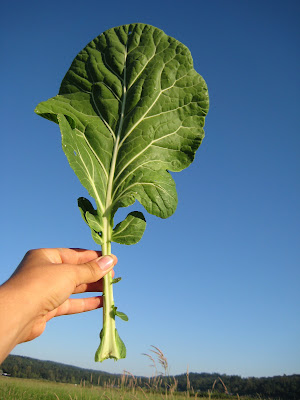The farm is teeming with plants that are part of the genus Brassica. Here is a tidy definition from Wikipedia: Brassica is a genus of plants in the mustard family (Brassicaceae). The members of the genus may be collectively known either as cabbages, or as mustards. Crops from this genus are sometimes called cole crops, which is derived from the Latin caulis, meaning stem or cabbage ("Brassica." Wikipedia, The Free Encyclopedia, 22 Jun. 2010. Web. 16 Jul. 2010.).
Only upon coming to the farm did I learn about the genus Brassica and all of the common plants that are a part of it. When I first got here all of the vegetables we were harvesting were Brassicas. Now 70% of what we harvest is still Brassicas. I was amazed to find that such a variety of vegetables are related.
Here is an illustrated list:
RADISH
Our radishes bolted due to wet weather and a flooded field; now they have lovely purple flowers on them. Like the yellow mustard they attract beneficial insects.

KOHLRABI
YELLOW MUSTARDAlso known as field mustard or turnip mustard. This plant is considered a weed here on the farm but is left growing whenever possible because of its role as a beneficial: bugs like ladybugs and parasitic wasps and flies are drawn to it. It is growing between our rows of potatoes, making a beautiful bright yellow field. It also has a sweet scent that fills the air. This plant is closely related to the mustards that are used to produce rapeseed/canola oil. The name 'rape'-seed comes from the species name rapa (Brassica Rapa) which itself comes from latin for turnip, , rāpum or rāpa.
CAULIFLOWER
Here is a baby cauliflower plant

And full grown.
ROMANESCO
Romanesco can be described as like a cross between broccoli and cauliflower. It is also called roman cauliflower and romanesco broccoli. It is cooler than regular cauliflower because of the trippy spiral formations on the head.
BROCCOLI
CABBAGE

KALE
Green curly leaf.
Red curly leaf.
Dino kale (which is the best because it looks like dinosaur skin and you can probably tell children that it is dinosaur skin and they would believe you).
COLLARD GREENS
TURNIPS











No comments:
Post a Comment